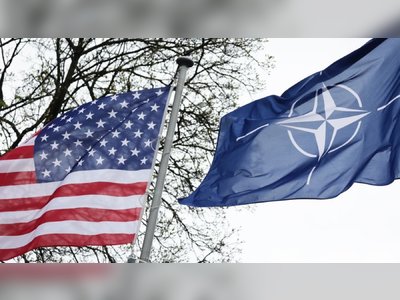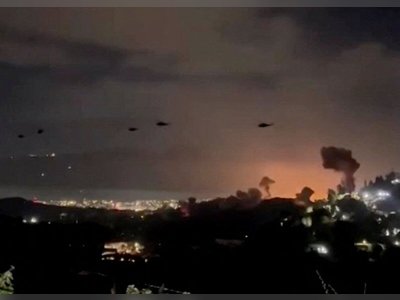
India Announces Water Cutoff from Rivers Irrigating Pakistan Amid Rising Tensions
In retaliation for a deadly terrorist attack, India suspends participation in a 1960 water-sharing treaty with Pakistan.
On Tuesday, India announced it would "cut off water" from rivers originating on its territory and flowing into Pakistan, escalating tensions between the two nations following a recent terrorist attack in Indian-administered Kashmir that resulted in 26 fatalities.
Prime Minister Narendra Modi, in a public address, stated that water previously flowing out of India would now be utilized to serve the country's interests.
The Indian government has suspended its participation in a bilateral treaty established in 1960 that governs the sharing of water resources between the two countries.
The decision follows a deadly attack in the tourist town of Pahalgam, which India has attributed to Pakistan, a claim that Islamabad has firmly denied.
In response to India's announcement, a spokesperson from the U.S. State Department stressed the importance of both nations working towards a responsible resolution to maintain long-term peace and stability in South Asia.
The ongoing conflict has seen heightened military readiness from both sides with increased cross-border firings reported without casualties, according to Indian officials.
Pakistan has accused India of manipulating the flow of the Chenab River, one of three rivers covered under the 1960 treaty.
Kazim Pirzada, Punjab's Minister for Irrigation, stated that significant and unnatural reductions in the river's flow had been observed.
The Pakistan administration warned that any attempt to alter the flow of these rivers could be interpreted as an act of war.
The 1960 treaty, established in the aftermath of the partition of British India in 1947, delineates the water-sharing rights for six rivers in Kashmir—three allocated to India (Ravi, Beas, and Sutlej) and three allotted to Pakistan (Indus, Jhelum, and Chenab), which together comprise approximately 80% of the basin's total water volume.
While India has rights to utilize these rivers for irrigation and hydroelectric projects, it is prohibited from diverting their flow or impacting downstream volumes.
Experts have indicated that long-term interruption of river flows is not feasible; however, slight changes in water release schedules, rather than volume, could significantly disrupt agricultural seasons in Pakistan, according to the Jinnah Institute.
The announcement of the water cut comes amid the most severe bilateral tensions in years, with fears of potential military confrontation between the two nuclear-armed nations.
In recent days, both nations have engaged in military drills and missile tests; Pakistan conducted trials of surface-to-surface missiles, one of which has a range of 450 kilometers, aligning with the distance from its border to the Indian capital, New Delhi.
India's government is preparing for possible civil defense exercises, citing the need to educate its population on protective measures in the event of an attack.
Amid these rising tensions, United Nations Secretary-General Antonio Guterres has called on both nations to "step back from the precipice," emphasizing the critical need to avoid a military confrontation that could spiral out of control.
Iran has also initiated mediation efforts, with its foreign minister holding discussions in Islamabad and expected to visit New Delhi shortly.
Prime Minister Narendra Modi, in a public address, stated that water previously flowing out of India would now be utilized to serve the country's interests.
The Indian government has suspended its participation in a bilateral treaty established in 1960 that governs the sharing of water resources between the two countries.
The decision follows a deadly attack in the tourist town of Pahalgam, which India has attributed to Pakistan, a claim that Islamabad has firmly denied.
In response to India's announcement, a spokesperson from the U.S. State Department stressed the importance of both nations working towards a responsible resolution to maintain long-term peace and stability in South Asia.
The ongoing conflict has seen heightened military readiness from both sides with increased cross-border firings reported without casualties, according to Indian officials.
Pakistan has accused India of manipulating the flow of the Chenab River, one of three rivers covered under the 1960 treaty.
Kazim Pirzada, Punjab's Minister for Irrigation, stated that significant and unnatural reductions in the river's flow had been observed.
The Pakistan administration warned that any attempt to alter the flow of these rivers could be interpreted as an act of war.
The 1960 treaty, established in the aftermath of the partition of British India in 1947, delineates the water-sharing rights for six rivers in Kashmir—three allocated to India (Ravi, Beas, and Sutlej) and three allotted to Pakistan (Indus, Jhelum, and Chenab), which together comprise approximately 80% of the basin's total water volume.
While India has rights to utilize these rivers for irrigation and hydroelectric projects, it is prohibited from diverting their flow or impacting downstream volumes.
Experts have indicated that long-term interruption of river flows is not feasible; however, slight changes in water release schedules, rather than volume, could significantly disrupt agricultural seasons in Pakistan, according to the Jinnah Institute.
The announcement of the water cut comes amid the most severe bilateral tensions in years, with fears of potential military confrontation between the two nuclear-armed nations.
In recent days, both nations have engaged in military drills and missile tests; Pakistan conducted trials of surface-to-surface missiles, one of which has a range of 450 kilometers, aligning with the distance from its border to the Indian capital, New Delhi.
India's government is preparing for possible civil defense exercises, citing the need to educate its population on protective measures in the event of an attack.
Amid these rising tensions, United Nations Secretary-General Antonio Guterres has called on both nations to "step back from the precipice," emphasizing the critical need to avoid a military confrontation that could spiral out of control.
Iran has also initiated mediation efforts, with its foreign minister holding discussions in Islamabad and expected to visit New Delhi shortly.











